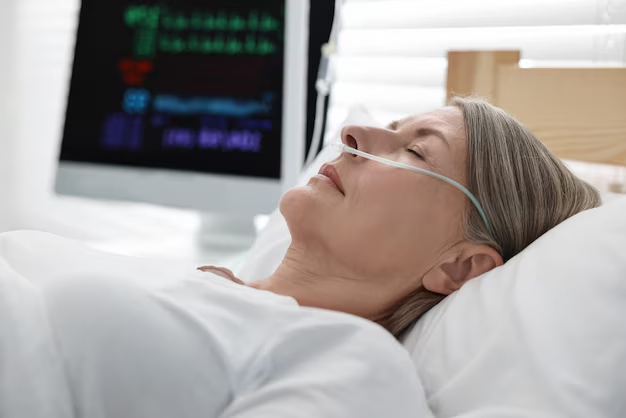Your Guide to Does Medicare Cover Sleep Apnea Testing
What You Get:
Free Guide
Free, helpful information about Medicare Insurance and related Does Medicare Cover Sleep Apnea Testing topics.
Helpful Information
Get clear and easy-to-understand details about Does Medicare Cover Sleep Apnea Testing topics and resources.
Personalized Offers
Answer a few optional questions to receive offers or information related to Medicare Insurance. The survey is optional and not required to access your free guide.
Is Medicare Your Solution for Sleep Apnea Testing Costs?
Sleep apnea can often feel like an invisible thief, quietly robbing many individuals of a good night's rest and, consequently, their quality of life. If you've ever woken up with unexplained fatigue or been told about your irregular snoring patterns, you might be considering a sleep apnea test. But is Medicare on your side when it comes to covering these essential evaluations?
Medicare Coverage for Sleep Apnea Testing
Yes, Medicare does cover sleep apnea testing, provided specific conditions are met. The fundamental point to understand is that Medicare will cover the cost if the test is deemed "medically necessary." This often involves a doctor’s order based on symptoms suggesting sleep apnea, such as excessive daytime sleepiness, snoring, or witnessed apnea episodes. Typically, Medicare covers various types of sleep studies, including home sleep tests (HST) and more comprehensive studies conducted in sleep centers.
Original Medicare Part B covers 80% of the Medicare-approved cost for these tests, after meeting your Part B deductible. Beneficiaries are then responsible for the remaining 20% unless they have supplemental insurance, like Medigap, which could cover these costs. For those enrolled in a Medicare Advantage Plan (Part C), the situation might vary as these plans often offer additional benefits, although it’s crucial to check with your specific plan provider.
Planning Your Sleep Study: Steps to Consider
When planning for a sleep study, here are a few steps to help ensure you can leverage Medicare’s benefits effectively:
Consult Your Primary Care Physician: Discuss your symptoms to determine if a sleep study is warranted. Make sure the sleep test is ordered by a physician participating in Medicare.
Select a Medicare-Approved Provider: Ensure that the sleep study facility or provider accepts Medicare, reducing the potential for unexpected costs.
Verify Coverage with Medicare or Your Plan: Even after doctor approval, confirm the specifics of coverage directly with Medicare or your Medicare Advantage provider.
Consider Possible Additional Costs: Be aware of any additional costs, like the 20% coinsurance or potential extra services not covered by Medicare.
Explore More Financial Assistance Options
For those worried about the associated costs, other financial assistance pathways are available. Medicare isn’t the only program designed to help you maintain your health without draining your bank account.
Government aid programs, financial assistance, and educational grants might also be at your disposal. Resources such as Medicaid, State Pharmaceutical Assistance Programs (SPAPs), and public health services can sometimes bridge gaps for those in need. Particularly for individuals who qualify under specific financial or health-related criteria, these resources can be pivotal in accessing critical healthcare services.
Moreover, organizations aiding with debt relief options and credit card solutions could assist in managing any financial burdens you might face as a result of healthcare expenses.
Keeping a proactive approach, assessing eligibility early on, and discussing open options with financial advisors or healthcare navigators can demystify these opportunities.
Resourceful Financial Avenues to Consider:
- 🏥 Medicaid: For individuals with limited income, Medicaid offers expansive health coverage, often covering more than Medicare.
- 💳 Credit Counseling Services: Organizations that help manage debt and provide money management advice could assist if healthcare costs become unmanageable.
- 💼 Local Community Services: These often provide health or financial services at reduced costs.
- 📚 Educational Grants: For caregivers or those seeking skills in healthcare, educational grants can offset costs of gaining certifications beneficial for employment in the industry.
Navigating health expenses can be a daunting task, but by tapping into available resources and programs, the journey becomes more empowering. Sleep apnea testing, vital to diagnosing a potentially hazardous condition, doesn’t have to be a financial strain with Medicare and other aid programs standing as your allies.
What You Get:
Free Medicare Insurance Guide
Free, helpful information about Does Medicare Cover Sleep Apnea Testing and related resources.

Helpful Information
Get clear, easy-to-understand details about Does Medicare Cover Sleep Apnea Testing topics.

Optional Personalized Offers
Answer a few optional questions to see offers or information related to Medicare Insurance. Participation is not required to get your free guide.


Discover More
- Am I Elgible For Medicare
- Am I Enrolled In Medicare
- Am I Qualified For Medicare
- Are Adult Diapers Covered By Medicare
- Are Chemotherapy Drugs Covered By Medicare Part d
- Are Colonoscopies Covered By Medicare
- Are Covid Tests Covered By Medicare
- Are Cpap Machines Covered By Medicare
- Are Cpap Supplies Covered By Medicare
- Are Dental Implants Covered By Medicare
